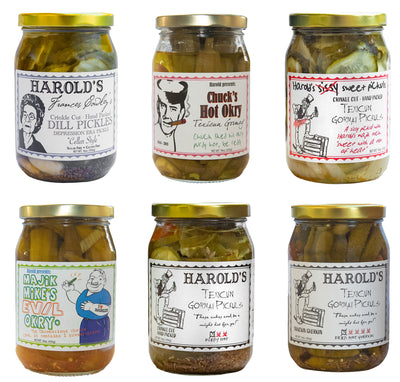Gourmet vs Regular Pickles: Quality Comparison
Gourmet pickles and regular pickles serve different purposes depending on your taste and budget. Gourmet pickles focus on premium ingredients, bold flavors, and small-batch production, making them ideal for special occasions or enhancing meals. Regular pickles, on the other hand, prioritize affordability, consistency, and long shelf life, making them a practical choice for everyday use.
Key Differences:
- Gourmet Pickles: Made with organic vegetables, natural sea salt, and whole spices. They offer complex flavors and a crunchier texture but are pricier and less widely available.
- Regular Pickles: Mass-produced with standard cucumbers, preservatives, and simpler flavors. They are budget-friendly, easy to find, and have a longer shelf life.
Quick Comparison:
| Aspect | Gourmet Pickles | Regular Pickles |
|---|---|---|
| Flavor | Bold and layered | Simple and tangy |
| Price | Higher | Lower |
| Availability | Limited | Widely available |
| Ingredients | Premium, no additives | Standard, with preservatives |
| Shelf Life | Shorter | Longer |
| Texture | Crunchier | Softer |
| Variety | Wide range | Basic options |
If you enjoy experimenting with flavors or hosting guests, gourmet pickles are worth trying. For everyday meals or snacks, regular pickles are a dependable choice. Many people keep both types on hand to suit different needs.
Pickle Expert Guesses Cheap vs Expensive Pickles | Price Points | Epicurious

1. Gourmet Pickles
Gourmet pickles are a true celebration of artisanal care and attention to detail. These pickles start with the finest, freshest ingredients, often sourced from trusted local farms. By selecting specific cucumber varieties known for their crispness and pairing them with sea salt, garlic, and whole spices, producers create a flavor profile that's anything but ordinary.
What sets gourmet pickles apart is the small-batch production process. This method allows producers to fine-tune flavors, adapt to seasonal ingredients, and honor traditional pickling techniques. The result? A taste experience that's layered, rich, and far superior to the one-note flavors of mass-produced pickles.
Take Harold's Texicun Gormay Pickuls as an example. This brand blends classic pickling methods with bold, spicy flavors, offering a perfect mix of quality and tradition that elevates the humble pickle to something extraordinary.
2. Regular Pickles
Regular pickles are all about practicality and mass production. Made in large-scale facilities, they start with standard cucumbers that go through automated processes designed for speed and consistency. The brine used typically contains vinegar, salt, and preservatives to boost shelf life, along with ground spices to maintain a consistent flavor. The result? A straightforward, tangy, and salty taste that works perfectly as a dependable condiment for everyday meals. Unlike gourmet pickles, these are all about efficiency and affordability, with less emphasis on craftsmanship or unique flavors.
sbb-itb-820fb79
Pros and Cons
When it comes to pickles, deciding between gourmet and regular varieties involves weighing flavor, ingredients, and cost. Each option has its strengths and weaknesses, depending on what matters most to you.
Gourmet pickles stand out for their complex flavors and high-quality ingredients. Crafted with unique spice blends and premium cucumbers, they offer a flavor experience that's hard to match. Small-batch production often ensures better texture and attention to detail. However, this level of quality comes with a higher price tag, and finding them at your local store can be a challenge.
On the other hand, regular pickles win in terms of affordability and accessibility. They're easy to find, whether you're at a supermarket or a gas station, and their consistent taste means you always know what you're getting. The trade-off? Fewer flavor options and a simpler taste. Mass production can also lead to softer textures, and the ingredient list typically includes more preservatives.
Another key difference is shelf life. Gourmet pickles tend to have a shorter storage window, while regular pickles last much longer. Here's a quick comparison of the two:
| Aspect | Gourmet Pickles | Regular Pickles |
|---|---|---|
| Flavor | Complex, unique profiles | Simple, consistent taste |
| Price | Higher cost per jar | Budget-friendly |
| Availability | Limited retail locations | Widely available |
| Ingredients | Premium, minimal additives | Standard, more preservatives |
| Shelf Life | Shorter duration | Extended storage time |
| Texture | Firmer, crunchier | Softer consistency |
| Variety | Wide range of flavors | Basic options |
So, which should you choose? It depends on the occasion and how often you eat pickles. Gourmet pickles are perfect for special events, like dinner parties, or when you're looking to enhance a dish with a unique touch. Meanwhile, regular pickles are ideal for everyday meals, packed lunches, or when you're feeding a crowd on a budget.
If you’re a frequent pickle lover, gourmet options might feel too pricey for daily snacking. But for occasional treat-yourself moments, they’re worth the splurge. Many pickle fans keep both types on hand - regular pickles for everyday use and gourmet ones for when they want to elevate their meal or impress their guests.
Conclusion
Your preference for gourmet or regular pickles boils down to what you value more: bold, intricate flavors or everyday practicality. Gourmet pickles stand out for their small-batch craftsmanship and premium ingredients, making them perfect for special occasions or when you want to elevate a meal. On the other hand, regular pickles are the go-to choice for affordability and convenience, ideal for daily snacks and casual meals.
Why not keep both on hand? Regular pickles can handle your day-to-day cravings, while gourmet options can shine when you’re hosting or treating yourself. If you’ve never tried gourmet pickles before, consider starting with a single jar to see if their unique taste is worth the splurge. Both types have their place, offering their own kind of enjoyment to your table.
FAQs
Why are gourmet pickles usually more expensive than regular pickles?
Gourmet pickles often come with a higher price tag, and for good reason. They’re crafted using top-tier ingredients and frequently rely on small-batch production techniques. This means you’re likely getting pickles made with organic produce, high-quality spices, or even unexpected, bold flavor combinations - all of which add to their cost.
What sets these pickles apart is the artisanal approach many brands take. Every jar reflects a commitment to precision and care, with a focus on traditional methods and specialty ingredients. This dedication to quality and craftsmanship not only enhances the flavor but also explains why these pickles are a bit pricier than the standard options.
What makes the ingredients in gourmet pickles stand out compared to regular pickles?
Gourmet pickles are in a league of their own, thanks to their use of fresh, top-notch ingredients and a diverse mix of seasonings. Think fresh herbs like dill and garlic paired with carefully chosen spice blends that deliver layers of bold, exciting flavors.
Sometimes, gourmet pickles take things up a notch with extras like peppers, onions, or even rare spices, creating taste profiles that are anything but ordinary. This focus on quality and creativity is what sets them apart, offering a flavor experience that feels more elevated and unforgettable compared to everyday pickles.
Why do gourmet pickles spoil faster than regular pickles?
Gourmet pickles tend to have a shorter shelf life because they’re crafted with fresher, high-quality ingredients and are kept refrigerated instead of being pasteurized. Unlike standard pickles, which go through heat treatment to make them shelf-stable, gourmet varieties depend on cold storage to retain their flavor and crunch.
This emphasis on freshness and minimal processing gives them a more vibrant taste but also means they need to be enjoyed sooner to keep their quality intact.



Leave a comment